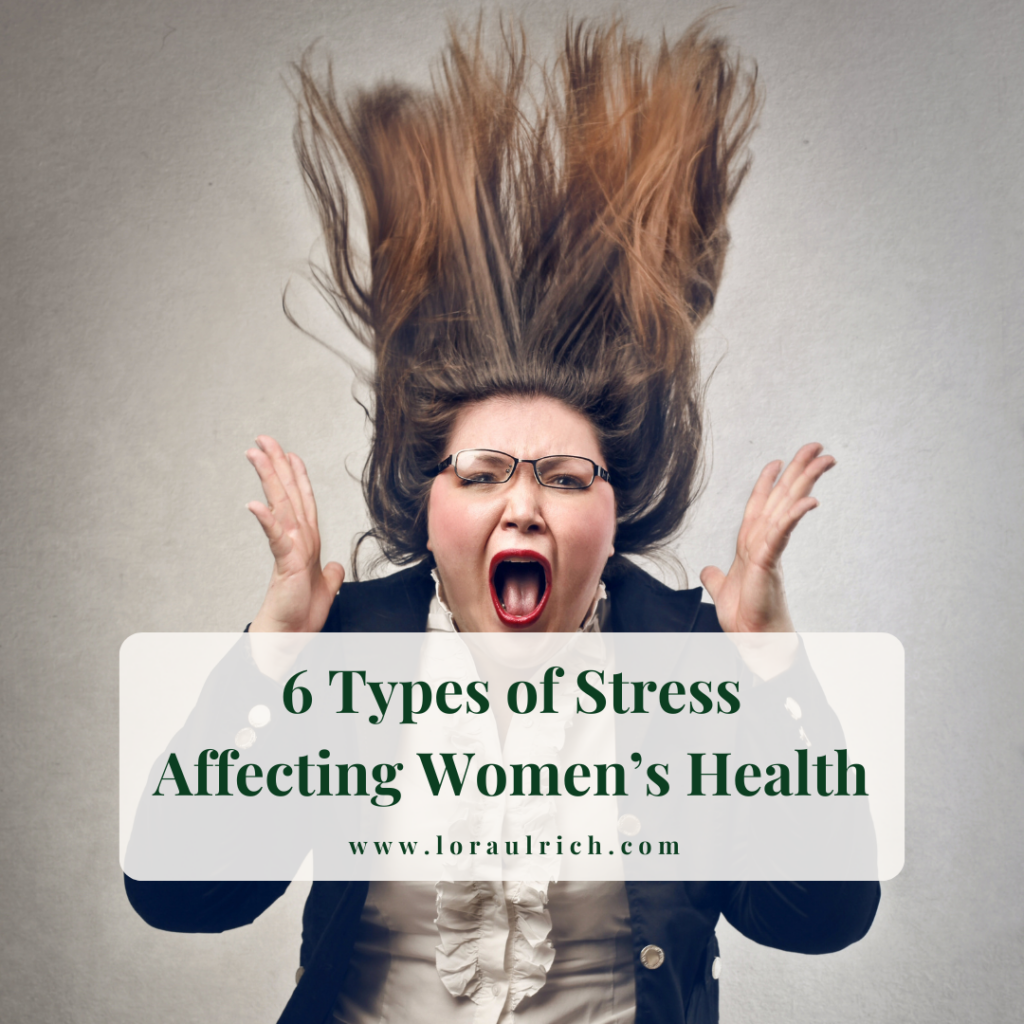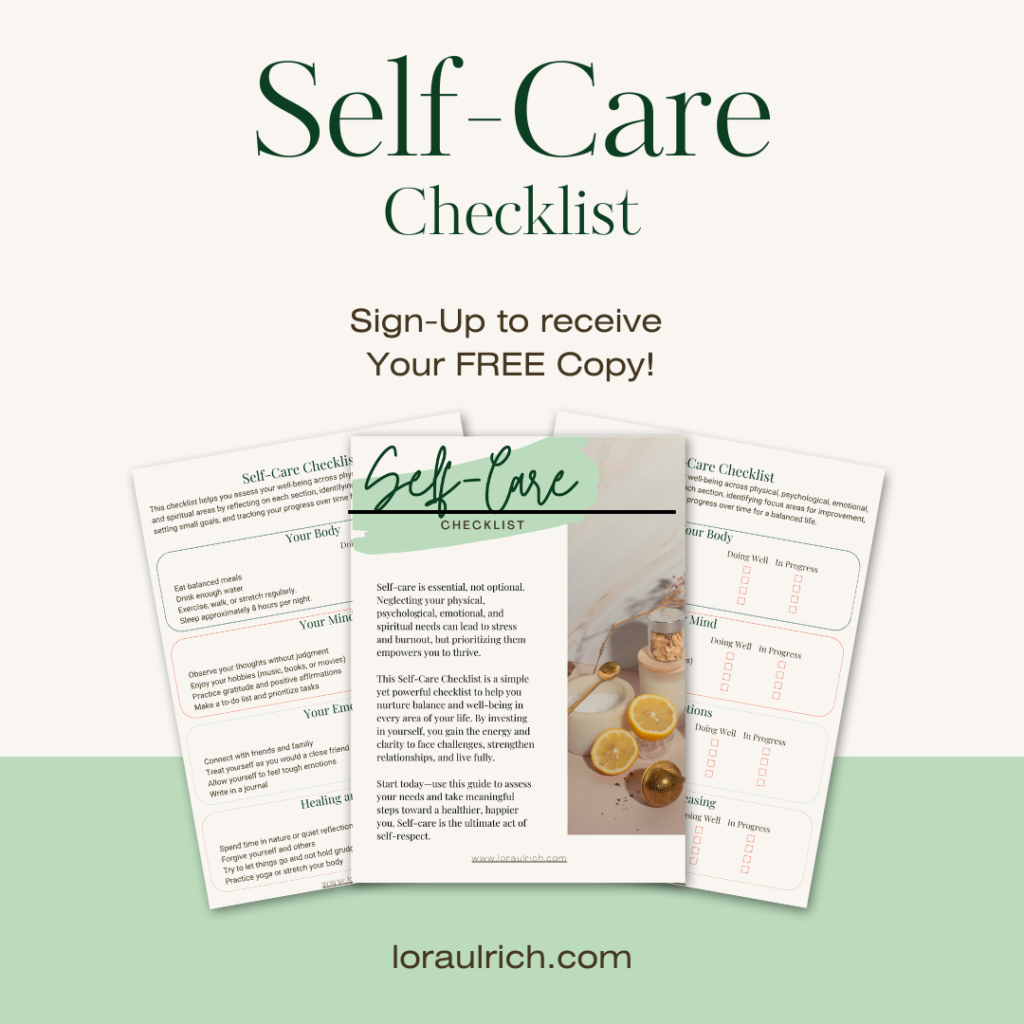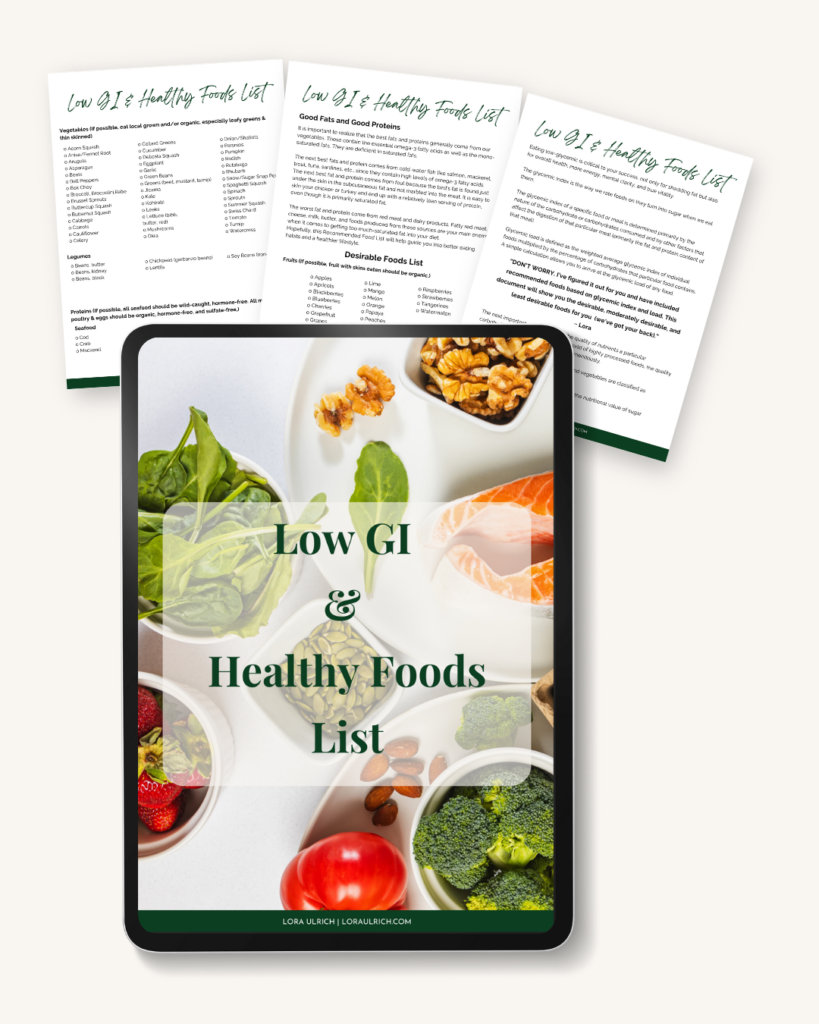The types of stress affecting women’s health go far beyond the occasional meltdown or bad day. Stress isn’t just about feeling frazzled or overwhelmed. It’s a biological response that affects everything from your hormones to your metabolism, especially for women navigating midlife, perimenopause, or menopause.
What many don’t realize is that not all stress looks or feels the same. There are six major types, and each one hits differently: emotionally, physically, and hormonally.
Recognizing the type you’re experiencing is the first step toward managing it (and feeling better). Let’s walk through each one, plus tips for how to start supporting your body through it.
Want a quick win before we start? Download my Free Self-Care Checklist (below) to build habits that soothe stress daily.

1. Acute Stress: The Quickest Type of Stress Affecting Women’s Health
This is the sudden kind. A quick, sharp response to a specific situation like a traffic jam, tough conversation, or an unexpected deadline.
Why it matters for women: Acute stress spikes cortisol fast. If you’re already dealing with hormone shifts in perimenopause, these spikes can throw off your sleep or even trigger hot flashes.
Tips:
- Take deep breaths and ground yourself in the present.
- Do some light stretching or take a short walk to calm your mind and body.
2. Episodic Acute Stress: One of the Most Overlooked Types of Stress Affecting Women’s Health
This is when that quick stress becomes a frequent visitor. Think jam-packed schedules, work stress, or caregiving overload.
Watch for: anxiety, irritability, or chronic headaches. This stress pattern can start to impact your digestion and energy.
Tips:
- Start your day with a “top 3 priorities” list, not a to-do marathon.
- Learning time management techniques, I recommend the Eisenhower Matrix!
- Use a planner or digital calendar to break tasks into manageable steps.
- Set boundaries to prevent over-committing.
3. Chronic Stress: The Long-Term Type of Stress Affecting Women’s Health and Hormones
This is the heavy hitter. Long-term stress, whether from financial strain, caregiving fatigue, or toxic relationships, keeps your nervous system on high alert 24/7.
Hormonal impact: Long-term cortisol elevation can drain your adrenals, disrupt thyroid function, and make midsection weight gain harder to shift.
Tips:
- Identify your main stressors and work on any lifestyle changes that may help.
- Practice mindfulness or meditation regularly to help reduce stress.
- Seek support from a counselor or join a support group for ongoing assistance.
Nutrition plays a huge role here. Grab my Free Low GI & Healthy Foods List (below) to start nourishing your body with ingredients that keep stress hormones in check.
4. Traumatic Stress: A Deeply Rooted Type of Stress Affecting Women’s Health at the Nervous System Level
This stems from major life events or past traumas like loss, abuse, accidents, or medical diagnosis. It can live in the body long after the moment has passed.
Body response: Trauma affects the HPA axis (your stress-regulation system) and can disrupt hormone balance for years.
Tips:
- Consider seeking support from a therapist or joining a support group.
- Seek out trauma-informed therapy. EMDR can be powerful.
- Add in somatic work like gentle movement, breathwork, or tapping.
5. Psychological Stress: The Inner Critic Type of Stress Affecting Women’s Health in Midlife
This type includes negative self-talk, perfectionism, and internal pressure. Often invisible but deeply felt.
Midlife mindset tip: Women in their 40s and 50s often experience a shift in identity. This can trigger old thought patterns or inner critic spirals.
Tips:
- Practice self-compassion by challenging negative thoughts and replacing them with more realistic ones.
- Surround yourself with supportive people, who normalize realness, not hustle.
- Consider talking with a mental health professional for ongoing support.
- Try thought reframing or CBT-based journaling prompts.
6. Physiological Stress: The Silent Type of Stress
This comes from inside the body: illness, poor sleep, blood sugar swings, dehydration, or even over-exercising.
Menopause connection: This kind of stress can worsen symptoms like fatigue, joint pain, or anxiety. These are often misattributed to aging alone.
Tips:
- Nourish your body with healthy foods, stay hydrated, and rest as much as needed.
- Engage in light physical activity, if possible, to improve your mood and aid recovery.
- Find a creative outlet or spend time with friends to lift your spirits and shift your focus.
Source: Verywell Mind
Bottom Line:
Don’t let stress take over your life!
You have the power to manage your stress and lead a happier, healthier life.
Remember, self-care is not selfish, it’s necessary!!!
Need help figuring out what’s behind your symptoms? Book a free 15-minute consultation (in my calendar below) with me to get a personalized plan for your unique stress profile.
Final Note:
Self-care isn’t selfish. It’s strategy. Especially when your body is shifting and needs a new level of support.
If you’re looking for techniques that actually work, read my guide on 5 Stress Management Techniques to start feeling better, no fluff, just doable steps.
My Gift To You: Your FREE Resources to Manage Stress during Midlife
Ready to take action, not just absorb info? These free resources were designed to help you manage the types of stress affecting women’s health with more ease and clarity, starting today!
Self-Care Checklist
A simple, powerful reminder system to help you stay grounded and supported, even on the busiest days.
Fill-out the form below to receive your copy and keep it on your fridge or phone for quick wins.

Low GI & Healthy Foods List
Grab Your FREE Copy of My Low GI & Healthy Foods List Guide (a.k.a. #loraapproved). This guide is great to see where foods are on the glycemic index.
This is for all eating styles so disregard the foods you don’t eat or like, or need to stay away from for digestion, weight, inflammation or health issues.
Fill-out the form below to receive your copy!

FAQs ABOUT THE TYPES OF STRESS AFFECTING WOMEN’S HEALTH
Stress impacts women on multiple levels: hormonally, emotionally, and physically. It can worsen perimenopausal symptoms, disrupt sleep, elevate cortisol, and even interfere with digestion and metabolism. Over time, it can also lead to chronic inflammation, fatigue, mood changes, and issues like insulin resistance.
While this post covers six key types, the three core categories recognized in many health circles are:
Acute stress: The short-term kind, triggered by immediate situations.
Episodic acute stress: When that short-term stress becomes frequent.
Chronic stress: The long-term, ongoing stress that has the most serious health consequences.
Different sources may list varying types, but one common addition to the six listed in this blog is environmental stress; such as noise, pollution, or overcrowded spaces that affect your physical and mental state.
Stress can show up in women as:
– Hormonal imbalances
– Increased PMS or menopausal symptoms
– Fatigue and brain fog
– Trouble sleeping
– Weight gain (especially around the belly)
– Anxiety, irritability, and even depression
If you’re experiencing any of these and wondering what’s driving it, book your free 15-minute consultation and let’s chat through it together.

+ show Comments
- Hide Comments
add a comment